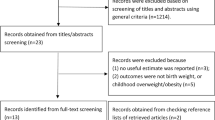Abstract
Objectives:
We analysed the association between coffee drinking before and during the three trimesters of pregnancy and the risk of preterm birth of babies normal for gestational age (NGA) or small for gestational age (SGA).
Methods:
Case–control study conducted in University clinics of North Italy. Cases were 502 women who delivered at <37 weeks of gestation. The controls included 1966 women who gave birth at term (⩾37 weeks of gestation) to healthy infants on randomly selected days at the hospitals where cases had been identified.
Results:
There was inverse association for coffee consumption in the third trimester of pregnancy in SGA cases compared to NGA (heterogeneity test between OR: χ12=5.6811 P<0.05). In comparison with not drinkers, all the ORs of overall intake of caffeine were closed near the unity for both SGA and NGA preterm birth.
Conclusion:
Compared with no consumption, a low consumption of coffee during pregnancy may not have significant effects on preterm birth.
This is a preview of subscription content, access via your institution
Access options
Subscribe to this journal
Receive 12 print issues and online access
$259.00 per year
only $21.58 per issue
Buy this article
- Purchase on Springer Link
- Instant access to full article PDF
Prices may be subject to local taxes which are calculated during checkout
Similar content being viewed by others
References
Aldridge A, Aranda JV, Neims MD (1979). Caffeine metabolism in the newborn. Clin Pharmacol Ther 25, 447–453.
Bracken MB, Triche EW, Belanger K, Hellenbrand K, Leaderer BP (2003). Association of maternal caffeine consumption with decrements in fetal growth. Am J Epidemiol 157, 456–466.
Breslow NE, Day NE (1980). Statistical Methods in Cancer Research. The Analysis of Case Control Studies, vol. I. IARC Publication no. 32 IARC: Lyon, France.
Dubin N, Pasternack BS (1986). Risk assessment for case-control subgroups by polychotomous logistic regression. Am J Epidemiol 123, 1101–1117.
Eskenazi B, Stapelton AL, Kharrazi M, Chee W-Y (1999). Associations between maternal decaffeinated and caffeinated coffee consumption and fetal growth and gestational duration. Epidemiology 10, 242–249.
Fenster L, Eskenazi B, Windham GC, Swan SH (1991). Caffeine consumption during pregnancy and spontaneous abortion. Epidemiology 2, 168–174.
Fortier I, Marcoux S, Beaulac-Baillargeon L (1993). Relation of caffeine intake during pregnancy to intrauterine growth retardation and preterm birth. Am J Epidemiol 137, 931–940.
McDonald AD, Armstrong BG, Sloan M (1992). Cigarette, alcohol, and coffee consumption and prematurity. Am J Public Health 82, 87–90.
Olsen J, Overvad K, Frische G (1991). Coffe consumption, birthweight, and reproductive failures. Epidemiology 2, 370–374.
Parazzini F, Chatenoud L, Surace M, Tozzi L, Salerio B, Bettoni G et al. (2003). Moderate alcohol drinking and risk of preterm birth. Eur J Clin Nutr 57, 1345–1349.
Parazzini F, Cortinovis I, Bortolus R, Fedele L, Decarli A (1995). Weight at birth by gestational age in Italy. Hum Reprod 10, 1862–1963.
Pastore LM, Savitz DA (1995). Case-control study of caffeinated beverages and preterm delivery. Am J Epidemiol 141, 61–69.
Peacock JL, Bland JM, Anderson HR (1995). Preterm delivery: effects of socioeconomic factors, psychological stress, smoking, alcohol, and caffeine. BMJ 311, 531–535.
Soyka LS (1979). Effects of methylxanthines on the fetus. Clin Perinatol 6, 37–51.
Williams MA, Mittendorf R, Stubblefield PG, Lieberman E, Schoenbaum SC, Monson RR (1992). Cigarettes, coffee, and preterm premature rupture of the membranes. Am J Epidemiol 135, 895–903.
Wisborg K, Kesmodel U, Bech BH, Hedegaard M, Henriksen TB (2003). Maternal consumption of coffee during pregnancy and stillbirth and infant death in first year of life: prospective study. BMJ 326, 420–422.
Acknowledgements
We thank Cristina Bosetti MD, for helping statistical analysis and Mrs Ivana Garimoldi for her editorial assistance. Partly supported by the Commission of the European Communities (contract no. QLK1-CT-2000-00069).
Author information
Authors and Affiliations
Corresponding author
Additional information
Guarantor: F Parazzini.
Contributors: FP was the principal investigator of the study giving the study hypothesis and planning the study design, FC and LC analysed the data, FC and FP drafted the paper, ER and VC assisted in analyses and writing, LF contributed to the conception and design of the study, LT and CM was involved in the baseline surveys for the study, LC took part in planning the study and interpreting the data and commented on the manuscript.
Rights and permissions
About this article
Cite this article
Chiaffarino, F., Parazzini, F., Chatenoud, L. et al. Coffee drinking and risk of preterm birth. Eur J Clin Nutr 60, 610–613 (2006). https://doi.org/10.1038/sj.ejcn.1602358
Received:
Revised:
Accepted:
Published:
Issue Date:
DOI: https://doi.org/10.1038/sj.ejcn.1602358
Keywords
This article is cited by
-
Maternal tea consumption and the risk of preterm delivery in urban China: a birth cohort study
BMC Public Health (2016)
-
Caffeine intake during pregnancy and adverse birth outcomes: a systematic review and dose–response meta-analysis
European Journal of Epidemiology (2014)



